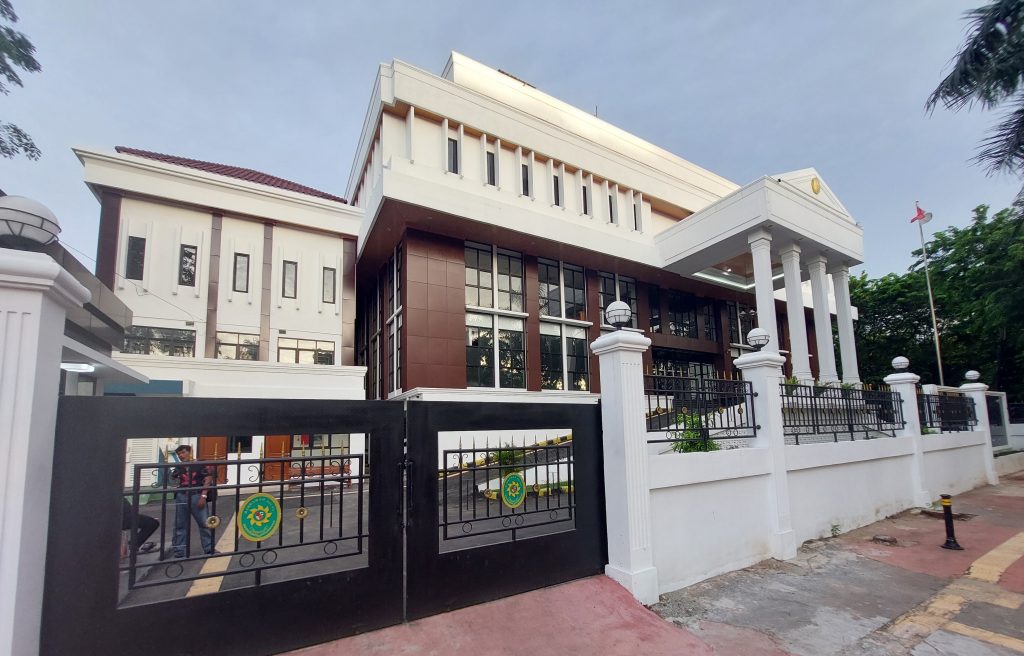Mining-affected communities vow a Supreme Court appeal to block DPM mine approval

● The Dairi Prima Mineral (DPM) mine under construction in north Sumatra poses potentially catastrophic safety and environmental risks, according to international experts.
● Local communities affected by the mine are challenging the environmental approval granted to the mine by Indonesia’s Ministry of Environment and Forestry.
● While the Jakarta Administrative Court ruled in favour of the communities earlier this year, the High Court has overruled that decision.
● Communities have vowed to take the case to the Supreme Court.
Press Realese: In response to a Jakarta High Court decision dealing a blow to their cause, mining-affected communities are vowing to take their case to the Supreme Court. This week, the High Court overruled an earlier decision by the Jakarta Administrative Court, which ruled that the Ministry of Environment and Forestry should not have granted environmental approval to the Dairi Prima Mineral (DPM) mine. The lower court found that the ministry had failed to implement good governance and had failed to protect people’s rights and the environment. The ruling took into account expert reports that the mine poses potentially catastrophic health and environmental risks. Now, affected communities who lodged the original complaint against DPM and the Ministry of Environment and Forestry say they will appeal the High Court decision.
“This DPM mine should not go ahead. The Administrative Court agreed with us. Now the High Court says the mine can have its environmental approval” said Ms. Tioman Simangunsong, a community representative from Dairi. “I completely disagree. It’s about time DPM and the Ministry of Environment and Forestry stop playing games with people lives and the environment”. Mr. Hotman Purba, another community representative from Dairi said: “We are appealing this to the Supreme Court. We have to. We know this mine will be dangerous. We know it will kill people, destroy farms, and damage the environment.” BAKUMSU, an association for legal support and advocacy in Medan, North Sumatra, acted as legal representative for affected communities. Mr. Tongam Panggabean, the director said “This case is an important one for all of Indonesia. If the Indonesian government can ignore people’s rights and the environment, all Indonesians are in danger”. “The decision is concerning. All parties, including the High Court, should not side with the poor environmental governance exhibited by the Ministry of Environment and Forestry. Now, the communities have no choice but to appeal to the Supreme Court”, said Mr. Panggabean. “Our area in North Sumatra is known for its high quality and clean agricultural produce. That could be destroyed by the DPM mine. They did not consult with us. They have been manipulating and sowing divisions within communities. We want them gone” said Mr. Hotman Purba, community representative.
Tongam Panggabean added that “The Ministry of Environment and Forestry has been actively supporting this company. It provided approval to an obviously dangerous mine. It then appealed the decision of the Administrative Court. It is clear it is comprised and lost sight of its mandate to protect people and the environment”.
Melky Nahar, national coordinator of JATAM, a network of mine-affected communities in Indonesia agreed: “around Indonesia we see government supporting companies abusing people’s rights and the environment. In the case of the Ministry of Environment and Forestry, it is totally against their mandate. Who can trust a government that does things like this?”. Natalie Bugalski, legal and policy director at Inclusive Development International, who has been working with Bakumsu and local affected communities for several years, said the case has wider implications for Indonesia’s future as a mining hub: “As the world shifts toward renewable energy and electric vehicles, it is imperative that the minerals and metals needed to fuel this transition are sourced in a way that respects the rights of people living on resource-rich land. We must rapidly transition to renewable energy sources and we need access to the transition minerals to do so—but in some cases, mining operations are simply too reckless to proceed. The DPM mine is one such case.”
Dr. Bugalski added: “Indonesia has tried to position itself as a global hub for responsible mining and production, but if the Indonesian government allows the DPM mine to proceed, its lack of commitment to protecting against the human rights impacts of these operations would be laid bare.” Dr. Stephen Emerman, who reviewed the DPM Environmental Impact Assessment documents, said “Of the hundreds of Environmental Impact Assessments for mine I have reviewed, this is undoubtedly the worst. It had so many errors, omissions and contradictions, which would mean in most places, it would just be thrown out”.
He added: “Then there are the serious concerns about the mine itself, which is designed well below safety standards. There was zero consideration of potential impacts of a tailings dam failure. All this for dam on unstable foundations, in a high rainfall area, in one of the highest earthquake risk zones of the world.” “It would be appalling if the Indonesian government continued to deny the dangers of the DPM mine and continued to support DPM”, Dr. Emerman said.
Background: The Dairi Prima Mineral (DPM) mine is in construction phase in North Sumatra, Indonesia. Because of significant changes to DPM's plans, in 2019, the Ministry of Environment and Forestry advised DPM to revise its environmental impact assessment in order to obtain Environmental Approval. Local communities affected by the project objected to the renewal of Environmental Approval for the mine, which they fear will cause catastrophic safety and environmental impacts. Environmental Impact Assessment documents produced by DPM for the renewed approval were reviewed by international experts in mine hydrology and civil engineering, who found that the mine as planned would be dangerous to people and the environment. Their reviews (which can be downloaded here and here) were shared with Indonesia’s Ministry of Environment and Forestry, who nevertheless provided Environmental Approval to DPM in August 2022.
Following this approval, concerned community members with support from NGOs lodged a legal complaint to the Jakarta Administrative Court challenging the environmental approval. The court upheld the community complaint in its entirety1. The Ministry of Environment and Forestry and DPM appealed the Administrative Court decision to the High Court, which made its decision in the case this week.
Much background information about the case can be found at https://bakumsu.or.id/en/advokasitambang/
Contact:
1. Community representatives can be contacted through Ms Monica Siregar Ph: +62 0823 6216 2928; email add: monicasiregar53@gmail.com. Languages: Bahasa Indonesia
2. Mr Tongam Panggabean. Director, BAKUMSU. Languages: Batak Toba, Indonesian, English (Tongam is available to translate for community representatives from Indonesian to English), Ph: +62 82168865578; email add: tongam.bakumsu@gmail.com
3. Mr. Melky Nahar. National Coordinator of community mining network, JATAM. Languages: Indonesian. ph: +62813-1978-9181; e-mail: melkynahar@gmail.com
4. Ms Natalie Bugalski, legal and policy director at Inclusive Development International. Languages: English. Time Zone: U.S. Eastern. Email: natalie@inclusivedevelopment.net
5. Dr. Steven Emerman, mine hydrologist and owner of Malach Consulting, Ph: 1-801-921-1228, Email: SHEmerman@gmail.com. Languages: English. Time Zone: USA, Mountain Daylight Time (GMT-6)
BAKUMSU
Bantuan Hukum dan Advokasi Rakyat Sumatera Utara
Jalan Bunga Kenanga No. 11 D,
Kelurahan Padang Bulan Selayang II
Kecamatan Medan Selayang, Medan 20156
Design by Robby Fibrianto Sirait
